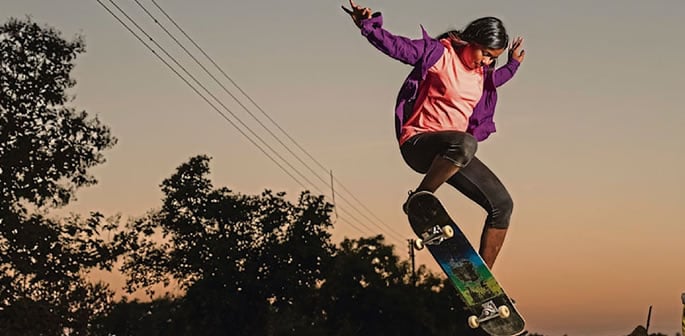"Every time I land a trick, I feel stronger"
Skateboarding in India is being redefined by women who refuse to stay on the sidelines.
Once seen as a subculture with little space for girls, the sport is now becoming a platform for female expression, freedom, and resilience.
Across cities and villages, young women are pushing against societal expectations and carving out their own paths on four wheels.
Their presence on the ramps and streets challenges long-held stereotypes about what women can and cannot do.
For many, skating is not just about tricks but about reclaiming public spaces and rewriting their futures.
In the process, these women are building a new culture, one that puts confidence, independence, and community at its core.
Breaking Barriers in Janwaar
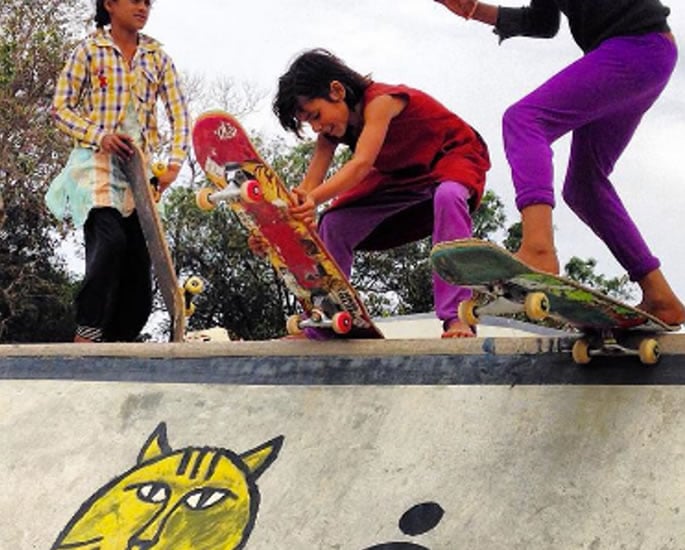
Madhya Pradesh’s Janwaar Castle, built in 2015 with the help of German activist Ulrike Reinhard and Berlin-based NGO Skate-Aid, became a sanctuary for children in rural India.
For Asha Gond, a young woman from the Adivasi community, it was life-changing.
She recalled: “At first, we didn’t understand what was being built.
“There were rumours: some said it would be an English school, others thought it might be a hostel or even a new hospital.
“But it was something completely different. When I saw the kids dropping in and carving on the ramp, I wanted to try it, too.”
What began as curiosity turned into empowerment. Gond became the first from her village to own a passport and represented India at the 2018 World Skateboarding Championship in China.
But her journey was not without hostility:
“The villagers talked a lot and told my father many lies, especially about me spending time with boys at the skatepark.
“He wanted me to get married, but I didn’t want to.
“There was a time when I went to the skatepark and found a threat written on the wall. I felt deeply hurt, but I tried to stay strong because challenges will always appear for people who are trying to do something good, especially when pushing against the system.”
Freedom & Resistance
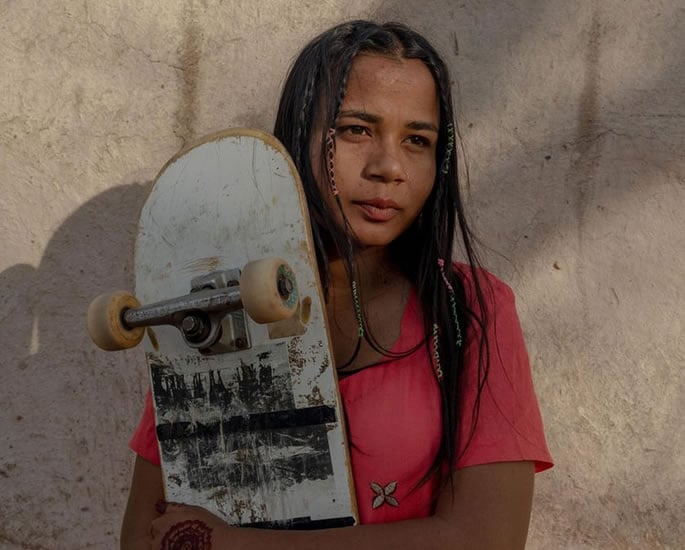
For Gond, skateboarding became a tool to reclaim her voice:
“Skateboarding empowers me as a woman because it gives me confidence and freedom to be a voice and no longer an echo.
“Every time I land a trick, I feel stronger; I prove to myself that I can do things people say I can’t.”
Photographer Chantal Pinzi, who documented Gond and other women skaters as part of her Shred the Patriarchy project, saw this empowerment first-hand:
“You don’t get a trick immediately; you need to be persistent. You try and try, you fall, maybe you hurt yourself, but you keep going until you get it.
“It gives you this sense of freedom. Once you’re skating, everything around you disappears completely.
“You don’t think about the problems in your life any more; you just focus on the trick and the specific moment.”
That freedom is rare for women in India, where ambition in sport is often met with scepticism or outright resistance.
For some, skateboarding has meant avoiding paths mapped out for them by others.
Mumbai’s Shruti Bhosle, national champion in 2019, credits the sport with saving her future:
“Skating’s my passion. I’ll always teach other girls. I want them to feel the same freedom it gave me.”
Building a Community Against the Odds
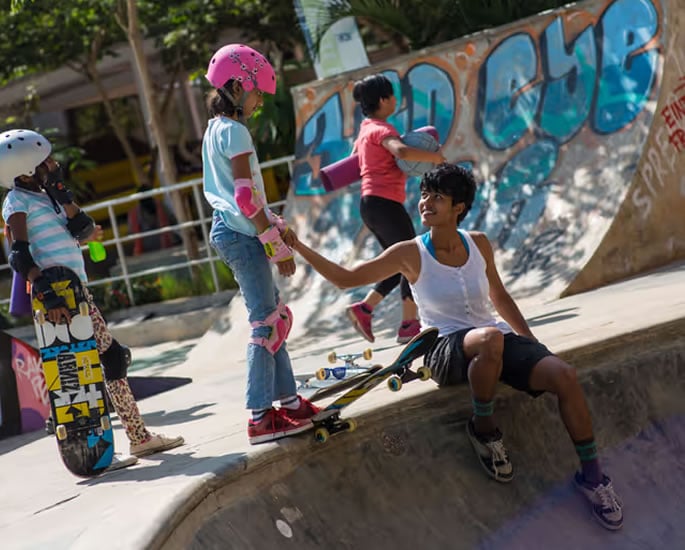
Unlike established sports, skateboarding in India has no fixed infrastructure. Public skateparks are scarce, and female skaters often practise in isolation.
In Delhi, 25-year-old Yaki Nabam knows that challenge well:
“Sometimes I feel like an outsider within the community, especially because there are no other women skating around me.
“Some of the guys treat me like I can’t land certain tricks just because I’m a woman. It’s frustrating, but it also makes me want to prove them wrong.”
The lack of community has been a barrier, but pockets of solidarity are forming.
Goa’s Youth Hostel skatepark in Panjim has become a hub where women skaters gather, often blending tradition and rebellion.
Pinzi noted: “The girls wear what they want, sometimes that’s traditional saris and kurtis, other times they wear jeans.
“Because it’s an iconic place for surfing, the skate scene developed from there. They try to get together during competitions to create this bond.”
Skateboarding has also meant redefining what it means to be a young woman in India.
Urmila Pabale from Mumbai recalls the ridicule she faced:
“I used to come home with dirty clothes, all sweaty, and they didn’t understand why I was doing it.”
Even now, she receives regular abuse.
“Strangers shout things like, ‘Don’t waste your time, get married’. I hear that all the time.
“People say I look or act like a boy, but honestly that doesn’t affect me any more; I know who I am. I’m doing what I love. Being myself seems to be a problem here [in India], but I won’t stop.”
A Changing Landscape
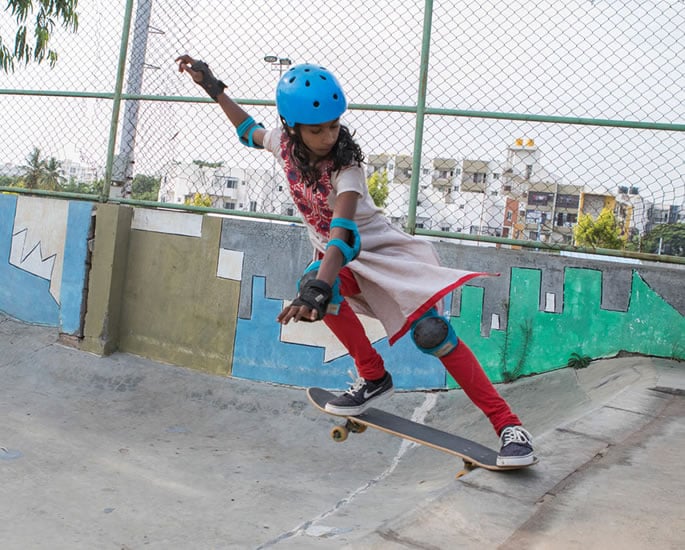
The rise of skateboarding in India has been helped by its Olympic status.
Pinzi explained: “That changed a lot of opinion. India is a really complex society and bringing honour to your own community through a victory, through a medal, means a lot.
“This recognition gives the freedom to practise it, especially for women. It’s sad you need that, but I think it was a turning point.”
Skaters like Shraddha Gaikwad embody this new wave.
Skateboarding gave her the chance to travel abroad for competitions, meeting idols like Brazilian Olympian Rayssa Leal.
She said:
“Boarding an aeroplane for the first time was overwhelming.”
“I felt a mix of excitement and nervousness. But I was determined to become a pro skater, so I focused on learning as much as possible.”
While resources remain limited, the sport is no longer seen as a fringe pursuit.
For many women, it represents possibility, a way to challenge stereotypes while dreaming of international recognition.
Indian women are rolling into spaces once closed to them, using skateboards as their entry tickets.
From rural Madhya Pradesh to urban Mumbai and Delhi, they are proving that a sport dismissed as foreign can spark cultural change.
Skateboarding has given them more than tricks; it has given them identity, resilience, and community.
For a generation of Indian women, the message is clear: the board is not just wood and wheels; it is freedom.




















































